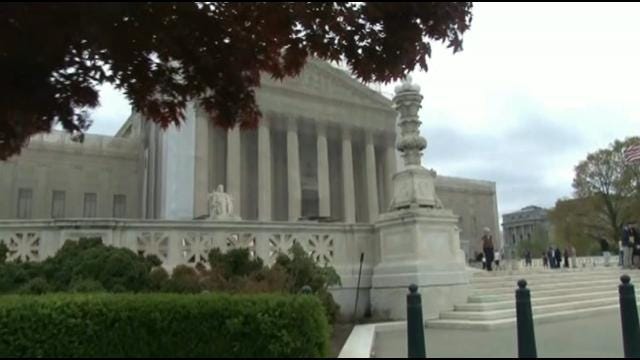Supreme Court Rules Indian Child Welfare Act Does Not Apply In Adoption Case
The U.S. Supreme Court decided Tuesday that the Indian Child Welfare Act does not apply to the case of an Oklahoma child adopted by a couple in South Carolina.Tuesday, June 25th 2013, 10:36 am
The U.S. Supreme Court decided Tuesday that the Indian Child Welfare Act does not apply to the case of an Oklahoma child adopted by a couple in South Carolina.
In a 5-4 opinion, the Supreme Court overturned a decision by the South Carolina Supreme Court, which ruled Veronica's father, Dusten Brown, was entitled to custody of the child based on the Indian Child Welfare Act.
The court ordered the case back to South Carolina for more proceedings.
Read the Supreme Court opinion
The South Carolina couple, Matt and Melanie Capobianco, adopted Veronica shortly after she was born in September 2009 in Bartlesville.
Dusten Brown is a member of the Cherokee Nation.
According to the Supreme Court, Brown agreed to relinquish his parental rights when his relationship with the girl's mother ended while she was still pregnant. The court says Brown provided no financial assistance to the mother or the girl for the duration of the pregnancy and the first four months after Veronica's birth.
The Supreme Court ruled that the ICWA was designed to counteract the unwarranted removal of Indian children from Indian families. According to the majority opinion, because the biological father didn't seek custody of Veronica until several months after her birth the law doesn't apply in this case.
The opinion disagreed with the South Carolina Supreme Court's reading of the law, saying it could not allow a biological Indian father to abandon his child in utero and refuse any support for the birth mother, then "play his ICWA trump card at the eleventh hour to override the mother's decision and the child's best interests."
Justice Samuel Alito wrote the majority opinion. Chief Justice John Roberts, Justices Anthony Kennedy, Clarence Thomas and Stephen Breyer had concurring opinions.
But Justice Sonia Sotomayor dissented and pointed out that the court's ruling doesn't mean Veronica will now go back to her adoptive parents. The law gives tribes and relatives a say in decisions affecting a child, she said.
"The majority does not and cannot foreclose the possibility that on remand, Baby Girl's paternal grandparents or other members of the Cherokee Nation may formally petition for adoption of Baby Girl," she said. "If these parties do so, and if on remand, Birth Father's parental rights are terminated so that an adoption becomes possible, they will then be entitled to consideration under the order of preference established in" federal law.
Her dissent was joined by Justices Antonin Scalia, Ruth Bader Ginsburg and Elena Kagan.
4/16/2013 Related Story: Supreme Court Hears Arguments In Oklahoma Adoption Case
Jessica Monday is a friend of Veronica's adoptive parents. She said she hopes she'll be returned to them.
"It's been a very difficult and emotional journey, you know, but we're at the final stage," Monday said.
Cherokee Principal Chief Bill John Baker held a news conference on the ruling Tuesday afternoon. "The best interests for her are to live in a loving home with a loving family here with her birth father," Baker said in a prepared statement.
Saying he's deeply disappointed, Baker pledged to help the Brown family continue its fight to win custody of Veronica.
Baker says the Cherokee Nation has a team of lawyers working on the case.
"Their fight is our fight and we will be here every step of the way," he said.


Craig Day
Craig Day anchors the 5, 6 & 10 o’clock newscasts at News On 6. He’s an Emmy and national Edward R. Murrow award winner, whose work has also been recognized with awards by several other journalism groups, including the Oklahoma Society of Professional Journalism, Oklahoma Associated Press, and broadcasting associations in Louisiana and Texas, including reporter and story of the year when he worked in Shreveport, Louisiana.
More Like This
September 29th, 2024
September 17th, 2024
Top Headlines
December 25th, 2024
December 25th, 2024
December 25th, 2024
December 25th, 2024












